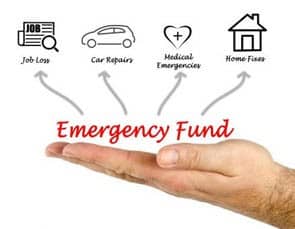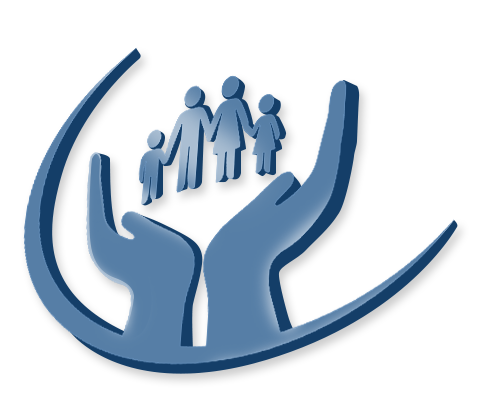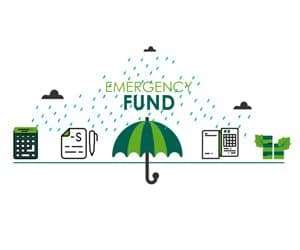How to Save for the Unexpected
Your furnace stops working during the coldest time of the year.
Your car springs an oil leak that will take hundreds of dollars to fix.
You lose your job when your employer decides to downsize.
Life is full of big mishaps like these. That’s why building an emergency fund is essential.
What is an emergency fund? It is money set aside—separate from other financial accounts—that is used only for unexpected expenses. It cushions any blow to savings you’ve built up for your future and, if large enough, keeps you from having to put large expenses on your credit card or having to take out a personal loan.
While it’s best practice to have an emergency fund no matter your circumstance, it’s imperative if you:
- Have just started budgeting and may forget to account for certain expenses
- You’re the only income earner in your home
- You’re self-employed
- You own a home
- You have medical issues
When to use (and not use) an emergency fund

- Keeping up with bills while between jobs
- Traveling to visit a sick family member or attend a funeral
- Paying a high deductible for a medical emergency
- Fixing a car that’s been damaged or needs repair
- Making a major home repair—to the HVAC system, the roof, plumbing or electrical
While it may be tempting to dip into emergency savings for other non-essentials, that’s not the intent of the fund. Emergency funds should not be used for:
- A vacation or destination wedding
- Elective healthcare
- Cosmetic updates to your home
- Routine car maintenance (this should be included in your budget)
- New electronics or furniture
How much emergency savings should I set aside?
Financial experts suggest keeping an emergency fund of at least three to six months of household expenses. Some experts recommend even more—like eight months of expenses—depending upon your situation.
A well-stocked emergency fund such as this will help ensure your household bills get paid should you lose your job or have to take an extended leave of absence from your job. So, if your mortgage or rent, utilities, gas and food total $3,000 a month, you’ll need a minimum of $9,000 in an emergency fund.
If you’re the primary wage earner who has a spouse and/or children who depend on your income, you should strive to save at least six months’ worth of expenses.
Getting started
Putting aside three to eight months’ worth of household expenses may seem overwhelming, so much so that it might feel like an insurmountable task. Instead of giving up hope, start small. Set a goal of saving $500. Once you achieve that, build upon it. Here’s how to get started:
1. Set a monthly goal
Once you get into the habit of saving a certain amount each month, it will be easier over time. The best way to achieve this—have funds automatically transfer to your emergency fund account each month.
2. Keep a change jar
When you break a larger bill, like $20, put the dollars and five-dollar bills in a change jar at home. Don’t forget the coins! They add up, too. When it’s filled, deposit the cash into your account. If you don’t use cash, use a savings app that will make automatic transfers into the account.
3. Move excess funds
If your checking account has extra funds after you’ve paid monthly bills, move some of that into your emergency fund. If you consistently find yourself without extra cash at the end of the month, review your expenses. What can be cut entirely from your expenses? Or, how can you save more? For example, eat out less or make coffee at home rather than stopping at the coffee shop.
4. Get supplemental income
If you’re able, take a second job until you’ve hit your emergency fund goals. If you have a specific talent, try making and selling items or doing freelance work. Or, find items around your house to sell.
5. Save your tax refund
Instead of spending your tax refund, have it automatically deposited into your emergency savings account. Another way to think about it—change your W-4 tax form to have less money taken out of your check and deposit the extra cash into your fund.
Where do I put my emergency fund?
Some people may suggest investing your emergency fund in the stock market because it’ll grow much more quickly. But, there are several drawbacks: the fund won’t be easily accessible, you may incur withdrawal penalty fees, and when stocks take a turn for the worse, so will your fund. Investing in bonds, although they are more stable than stocks, have similar drawbacks.
A money market account may be a better option because it tends to pay more interest than a conventional checking or savings account. Certificates of Deposit (CDs) also pay more interest than traditional savings, but the money must be kept in the CD until it matures, or you risk paying a penalty.
If you trust that you won’t access your emergency fund for non-emergencies, one of the best ways to save is through a high-yield savings account. High-yield accounts offer a higher interest rate than traditional accounts.
See Greater Alliance’s savings account options, including a “Don’t Touch!” account.
A note for those soon to retire
If you have an IRA or 401(k) account that you plan to draw from during retirement, you may think you no longer need an emergency fund. But you may want to have some cash saved for emergencies. Plus, 82% of parents say they would sacrifice themselves financially to help adult children. Soon-to-be retirees are encouraged to start an emergency fund within at least five years of retirement.
Begin saving with Greater Alliance
If you’re thinking of building an emergency fund and need help budgeting, Greater Alliance can help. We’ve partnered with GreenPath Financial Wellness Solutions to get you on track to financial wellness. Also, ask us about our traditional and club savings accounts by contacting us at info@greateralliance.org or calling 888-554-2328, ext. 280.


 Financial experts suggest keeping an emergency fund of at least
Financial experts suggest keeping an emergency fund of at least 